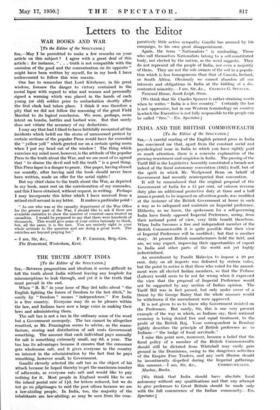THE TRUTH ABOUT INDIA [To the Editor of the SPECTATOR.]
SIR,—Between pragmatism and idealism it seems.slifficult to tell the truth about India without leaving any loophole for misconceptions to leak through, and yet it is the truth that must prevail in the end.
When " B. B." in your issue of May 3rd talks about " the English fighting the forces of freedom to the last ditch," he surely by " freedom " means " independence." For India is a free country. Everyone may do as lie pleases within the law, and Indians have now a large voice in making their laws and administering them.
The salt tax is not a tax in the ordinary sense of the word but a Government monopoly. The tax cannot be altogether remitted, as Mr. Pennington seems to advise, as the manu- facture, storing and distribution of salt costs Government something. The amount that each individual pays annually for salt is something extremely small, say 6d. a year. The tax has its advantages because it ensures that the consumer gets wholesome salt, and it gives everyone in the country an interest in the administration by the fact that he pays something, however small, to Government.
Gandhi cleverly selected the salt tax as the object of his attack because he hoped thereby to get the maximum number of adherents, as everyone eats salt and would like to pay nothing for it. Most people in England would like to see the inland postal rate of lid. for letters reduced, but we do not go on pilgrimages to raid the post offices because we are a law-abiding people. In India; too, the majority of the inhabitants are law-abiding, as may be seen from the, coin-.
paratively little active sympathy Gandhi has aroused by his campaign, to his own great disappointment.
Again, the term " Nationalists " is misleading. Those who call theMselves Nationalists belong to a self-constituted body, not elected by the nation, as the word suggests. They do not represent all the people of India, nor even a majority of them. They are not the sole owners of the soil in a popula- tion which is less homogeneous than that of Canada, Ireland, or South Africa. Obviously we cannot abandon all our interests and obligations in India at the bidding of a dis- contented minority.—I am, Sir, &c., CHARLES G. SPENCER.
Tarwood House, South Leigh, Oxon.
[We think that Sir Charles Spencer is rather straining words when he writes " India is a free country." Certainly the law is not oppressive, but in our Western terminology no country in which the Executive is not fully responsible to the people can be called " free."—En. Spectator.]














































 Previous page
Previous page